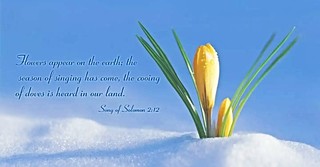
- Recent Translations
- All Translations
Cantares de Salomâo 2:11
Share
Settings
Images for Cantares de Salomâo 2:11

Cantares de Salomâo 2:11 Meaning and Commentary
For, lo, the winter is past, the rain is over [and] gone.
] A season of the year which keeps persons within doors, makes going abroad unsafe, unpleasant, and uncomfortable; very unfit for travelling, roads bad, rivers impassable, and journeying very difficult; but now this season being over, and the spring come, the weather fair, and every thing gay and pleasant, it is inviting to be abroad; winter is by some writers F18 used not for the season of the year, but for a storm or tempest. Thus the winter and rain may be descriptive of the state and condition of Jews and Gentiles before the coming of Christ F19, and which then ceased; it having been a stormy dispensation with the one, and a time of darkness and ignorance with the other, ( Hebrews 12:18-27 ) ( Acts 17:30 ) ; or rather it may in general represent the state of God's people both before and after conversion; before conversion it is a time of darkness, coldness, barrenness, and unfruitfulness; and which are removed by the powerful and efficacious grace of Christ: and after conversion it is often a winter season with them, through the blustering winds of Satan's temptations; the storms of impending wrath for sin, as they imagine; the nipping blasts of persecution, and sharp and severe afflictions they are at times exposed unto: moreover, they are often in great darkness of soul, clouds interpose between Christ and them; a great deal of coldness attends them, their hearts are frozen up and hard, and no impression made on them by the preaching of the word, or by the providences of God; there is a coolness in their love to God and Christ, his people, ordinances, cause, and interest; great barrenness and unfruitfulness in them, they look like trees in winter, and no appearance of fruit on them; their hands are sealed up from working, and they become indolent and inactive; and by all these fellowship with Christ is greatly interrupted: but, when the spring returns again, light breaks in upon them, and their hearts are melted with a sense of love; they become lively in their frames, and in the exercise of grace, and are fruitful in good works; and enjoy much calmness and serenity, peace and joy in the Holy Ghost: sometimes they think the winter is not over when it is, and fear more storms are behind, even of divine wrath and vengeance, though without reason; since Christ has bore all wrath for them, and has satisfied law and justice, and has delivered them from wrath to come; and he that has done this says, "the winter is past"
F18 "Grandaevumque patrem supplex, miseranda rogabo unam hyemem", Statii Achill. l. 1. v. 50, 51. Vid. Valer. Flacc. l. 1. v. 197.
F19 "Ante adventum Christi hyems erat, venit Christus, fecit aestatem", Ambros. Enarrat. in Paul. cxviii. octon. 7. p. 821.